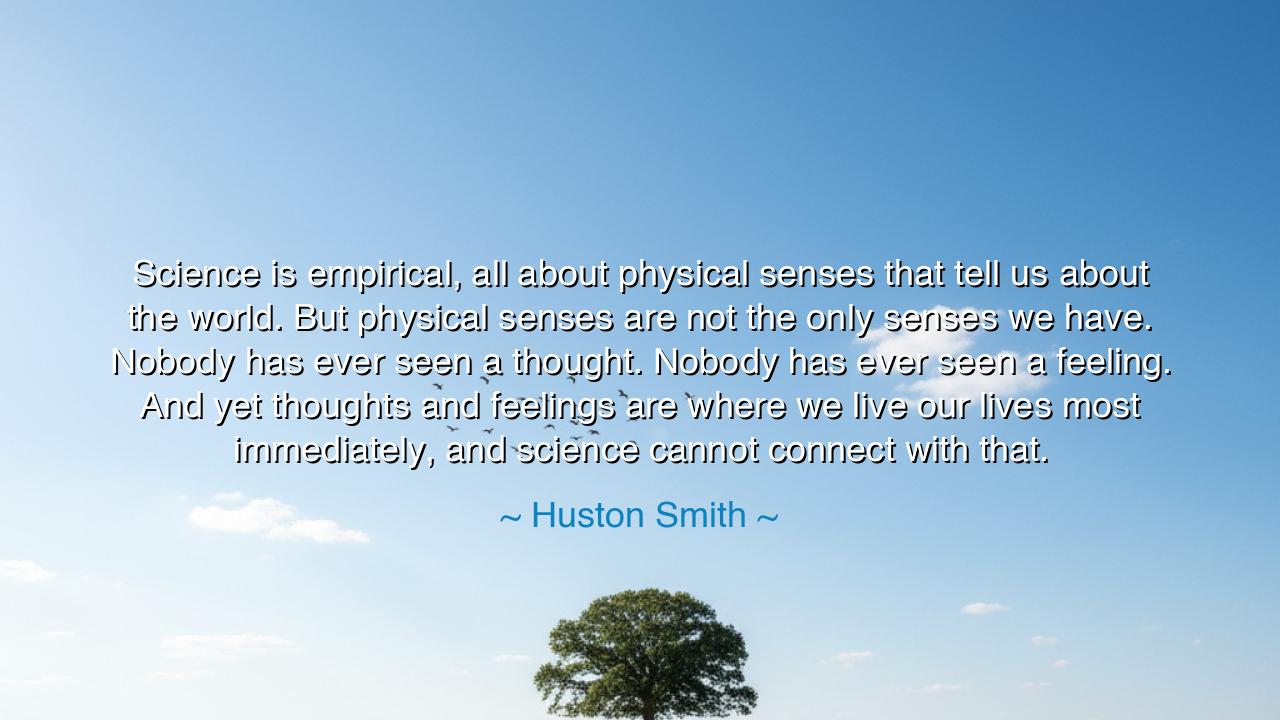
Science is empirical, all about physical senses that tell us
Science is empirical, all about physical senses that tell us about the world. But physical senses are not the only senses we have. Nobody has ever seen a thought. Nobody has ever seen a feeling. And yet thoughts and feelings are where we live our lives most immediately, and science cannot connect with that.






Hear, O Seekers of Truth, the words of Huston Smith, for they are the voice of wisdom that beckons us to see beyond the material world, to venture into realms where the heart and mind meet. "Science is empirical, all about physical senses that tell us about the world. But physical senses are not the only senses we have. Nobody has ever seen a thought. Nobody has ever seen a feeling. And yet thoughts and feelings are where we live our lives most immediately, and science cannot connect with that." In this profound statement, Smith reminds us that while science—with its reliance on the empirical, the observable, and the measurable—gives us great insights into the physical world, it is limited in its ability to reach the deepest truths of the human experience. For the world of thoughts, of feelings, and the internal realm is far more immediate and essential to our lives than the world that our senses perceive.
Consider, O Seekers, the ancient mystics, the sages, and the philosophers who did not simply look at the world through the lens of sensory perception. Plato, in his cave allegory, spoke of the shadows on the wall, the mere reflections of the true forms. He warned us that the world we see with our eyes may not be the true world at all, but only a distorted image of the deeper realities that lie beyond. Aristotle, too, in his investigations of the natural world, recognized the importance of the senses but also acknowledged that there was a realm beyond what could be seen, touched, or heard—one that could only be grasped through intellect, intuition, and the inner senses of the mind.
In the same way, Smith's words point us toward the deeper truths that lie beneath the surface of our physical senses. Thoughts and feelings—these are the things that guide our lives, that shape our decisions, and that give meaning to our existence. Yet no microscope or telescope can capture the depths of our inner life. We may not be able to see a thought or feel an emotion in the way we perceive the solidity of a tree or the vastness of the sky, but those inner experiences are what define our humanity. It is in the realm of thoughts and feelings that we find the true essence of our being, and it is in this realm that science, for all its power and knowledge, falls short.
Let us turn to the example of Isaac Newton, that great master of the physical world who unlocked the laws of motion and the force of gravity. His discoveries changed the course of history, and yet, within his own soul, he wrestled with the very mysteries of existence that science could not touch. Newton’s theories of the universe were monumental, yet they did not provide answers to the existential questions that plagued him. The vastness of the cosmos, the laws of nature, all the scientific wonders in the world could not answer the deepest longings of the human spirit—the questions of purpose, of meaning, and of the inner life. Science, for all its grandeur, cannot touch the soul, for it deals only with the observable, the measurable, and the physical.
And so, Smith's words are a reminder that there are dimensions of existence that lie beyond the reach of science. The emotions we feel, the thoughts that flow through our minds, the very awareness of our inner world—these are where we live our lives most immediately, and yet they are beyond the grasp of the physical sciences. There is a world inside of us, a world of subjective experience, that is as real, if not more real, than the world we see with our eyes. Science, in all its majesty, cannot explain the depths of love, the anguish of grief, the joy of creation, or the peace of mindfulness. It is here, in this inner world, that the true nature of our existence unfolds.
The lesson, O Seekers, is clear: while we must honor the power of science and the great discoveries it has brought to us, we must not fall into the trap of believing that it holds the key to all knowledge. Science can tell us about the workings of the universe, but it cannot tell us what it means to be human. It can describe the biology of the body, but it cannot explain the soul. Thoughts and feelings, these inner dimensions of existence, are where we truly live and where the most meaningful parts of our lives unfold. We must seek wisdom not only through the physical senses, but through the inner senses, the senses of the heart and mind.
So go forth, O Seekers, with the understanding that there is more to the world than what can be measured and observed. Cultivate your inner life as much as your outer life. Seek not only to know the world around you, but also the world within you. For it is in this realm of thoughts, feelings, and consciousness that you will discover the deepest truths, and it is through this exploration that you will find the wisdom that transcends the limitations of the physical world. As you seek to understand the universe, remember that the most profound mysteries may not be out there in the world, but within the very depths of your own being.






AAdministratorAdministrator
Welcome, honored guests. Please leave a comment, we will respond soon